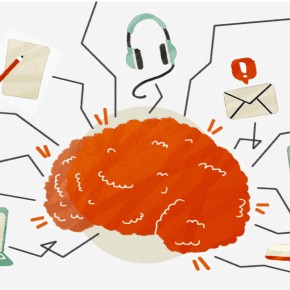
Do you find it hard to disconnect after work? Do you have trouble falling asleep? Find it difficult to concentrate on an important task? Do you often postpone complex tasks? These are all symptoms of lack of brain flexibility or resilience. The brain becomes trapped in low frequency, and finds it difficult to change to higher frequencies as the day progresses. In order to understand why and how this happens, and, more importantly, what we can do to have a healthy and productive brain, let’s first look at some basic characteristics of this amazing organ.
How does the brain work?
The brain is the centre of our nervous system. It is a sophisticated control panel, in charge of controlling all the other systems in our bodies. It processes and stores information and prepares adequate responses, most of them in an automatic and unconscious manner. This is all possible thanks to a complex and extensive network of neurones, which communicate through electrical signals sent out by the brain and measured in brain waves. The frequency of these brain waves gives us an indication of brain activity at any given time.
In 1875, British doctor Richard Caton became the first person to demonstrate on animals that electrical activity in the brain is linked to mental activity. In the 1920s, German neuropsychiatrist Hans Berger recorded the first electroencephalogram, and later went on to discover the link between certain mental activities and variations in the electrical impulses sent by the brain. At that time, he already surmised that certain abnormal signals were due to clinical disorders. In 1958, Joseph Kamiya, a professor at the University of Chicago, trained a volunteer in the emission of alpha brain waves (8-13Hz) and thus confirmed man’s ability to regulate brain wave activity.
How can stress cause the brain to deteriorate?
But stress, lack of sleep, inadequate nutrition or unhealthy habits can contribute to a deterioration of the brain. Loss of memory and elasticity of the brain, together with a general thinning of the cortex, can negatively affect our mental, emotional and physical wellbeing, mainly because this causes us to lose flexibility and the capacity to adapt. We become “stiffer” in every sense, something that is poorly suited to an ever more agile and changing world. The brain needs to be highly flexible in order to adapt to all the different activities we carry out throughout the day; lack of flexibility can negatively affect performance and state of mind, making us unable to adapt to changes and doing away with creativity.
Thanks to professor Kamiya, we now know that we can train the brain to be more flexible and more resilient. In other words, we can solve these problems which relate not only to our personal wellbeing, but also affect our professional performance. And so companies at the cutting edge of people management are increasingly getting on the wellness train, relying on what neuroscience has shown us. But how is this done?
How can you train your brain?
Brain training steps to follow
-
Information
One of the key answers is to give the brain something it understands and can process, something it excels at: information. The brain is a predictive machine, and the absence of information therefore generates confusion, stress and fantasy. When a piece doesn’t fit, when information is missing or a question goes unanswered, we are faced with uncertainty, and that’s something we can’t cope with. We become stalled and lose the flexibility required to turn to another task or take up a different subject. Communication is an excellent tool for calming the mind. If you work in a team, make sure that you always provide information in a timely manner. A true professional should always be ready to ask when he/she doesn’t know something or when information is missing.
-
Presence
As humans, we live in a peculiar paradox. Our brain works constantly in the present, but if there is a lack of presence we tend to look to the future or turn to the past. Training presence –“doing what you do”– is therefore essential. Multitasking hinders presence, it mixes up our brain waves and creates short circuits in our head. Mistakes, confusion, stress, anxiety, unnecessary arguments… these are all often caused by a poor combination of brain waves or by our inability to change them. You may have at times felt highly productive doing many things at once, whereas in fact what you are doing is superficial, repeating automatic patterns and mixing up frequencies. In other words, there is no creativity involved and you are not getting the best out of yourself. Remember that each task requires specific brain waves. Look for spaces where you are able to concentrate on your work, and avoid interrupting others. Work with a presence, and respect other people’s presence also.
-
Feedback
The brain has a natural ability to reorganise, thanks to its neuroplasticity. Offering feedback or requesting feedback is a very healthy exercise for the brain: it keeps it calm, allowing it to change, adapt and pursue its aim of learning and improving continuously. Feedback strengthens our effective behaviours and allows us to suppress those that don’t work. But above all, with feedback we give ourselves and others the chance to improve.
-
Renewal
Include moments for renewal in your daily agenda. We need to balance and compensate peaks of stress with periods of quietness: this would be a good exercise in self-control. Problems usually appear when a certain brain wave becomes dominant, when it is the main element in our daily lives, and that is exactly what modern-day living is achieving. A stress culture locks our brain into a beta wave pattern (a state of alert), with dire consequences for our wellbeing and therefore also for our performance. Hence the importance of learning to stimulate other types of waves: lower, slower frequencies which we achieve when we are truly relaxed. Include time slots for resting in your agenda, and train this by applying relaxation techniques or meditating on a daily basis.
-
Transitional activities
Encouraging brain resiliency and diversity in our actions has a positive impact on brain wave changes. When you have to switch from one task to another very different one, perform some transitional activities. In this way you will be giving your brain time to gradually adapt its electrical activity and gain flexibility, and you will slowly but surely achieve a high degree of resilience. An example of a transitional activity would be preparing a conversation or meeting before it actually takes place. Talking to somebody or consulting something with a colleague, a mentor or a supervisor would be a transitional activity for when you have to resolve a conflict or take a decision. When we have to carry out activities which are extremely tiring for the mind, the easier we make things for ourselves the better.
In short, our ability to concentrate, plan, contact or do anything at all is closely related to the combination of brain waves we are producing. And our efficiency depends on the flexibility we have in changing from wave to wave. Thus, plain sailing –the moment when we are able to give our best– occurs when all brain waves are perfectly aligned with the task in hand. Elasticity, or the capacity of the brain to recover from negative circumstances, can be developed. An elastic brain can return quickly to its original state when faced with difficulties or a crisis, without being hindered by repetitive or negative thoughts of self criticism, and this is conducive to achieving balance and wellbeing. Thus, working for rather than against oneself (if we fail to pay attention to what our brain needs) is the way to go in order to become much more productive in everything we do.








There are no comments yet